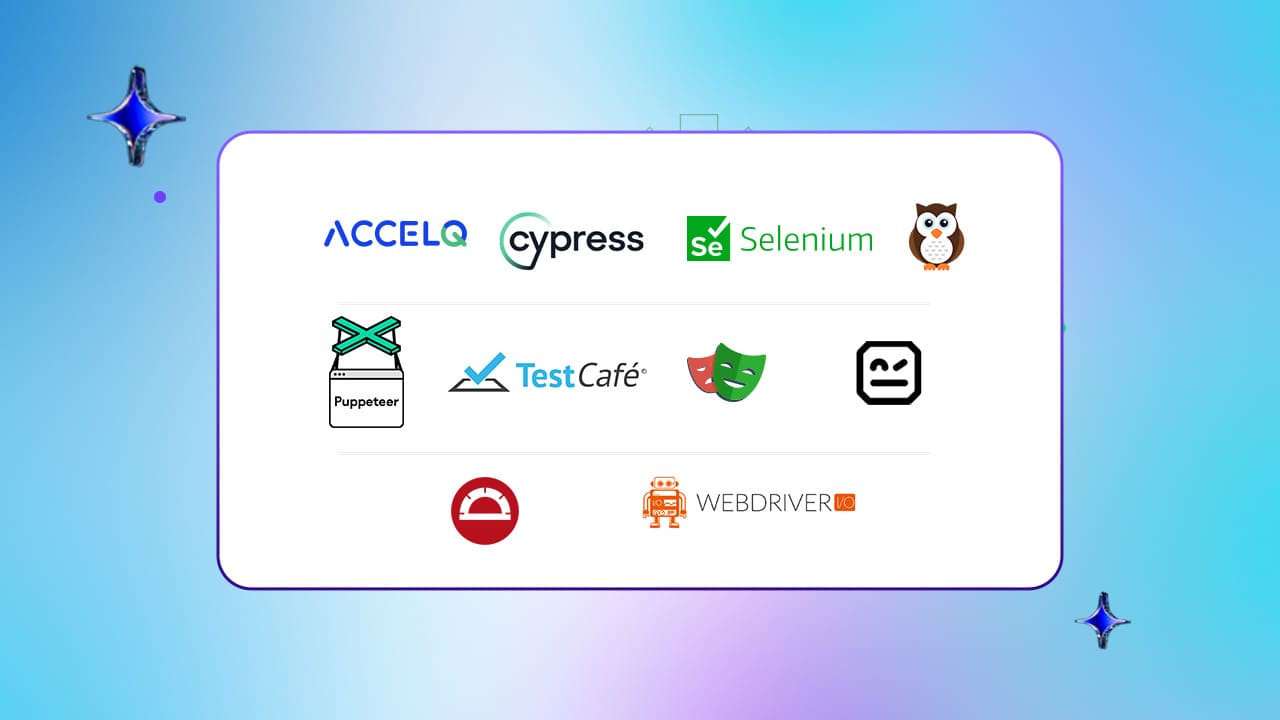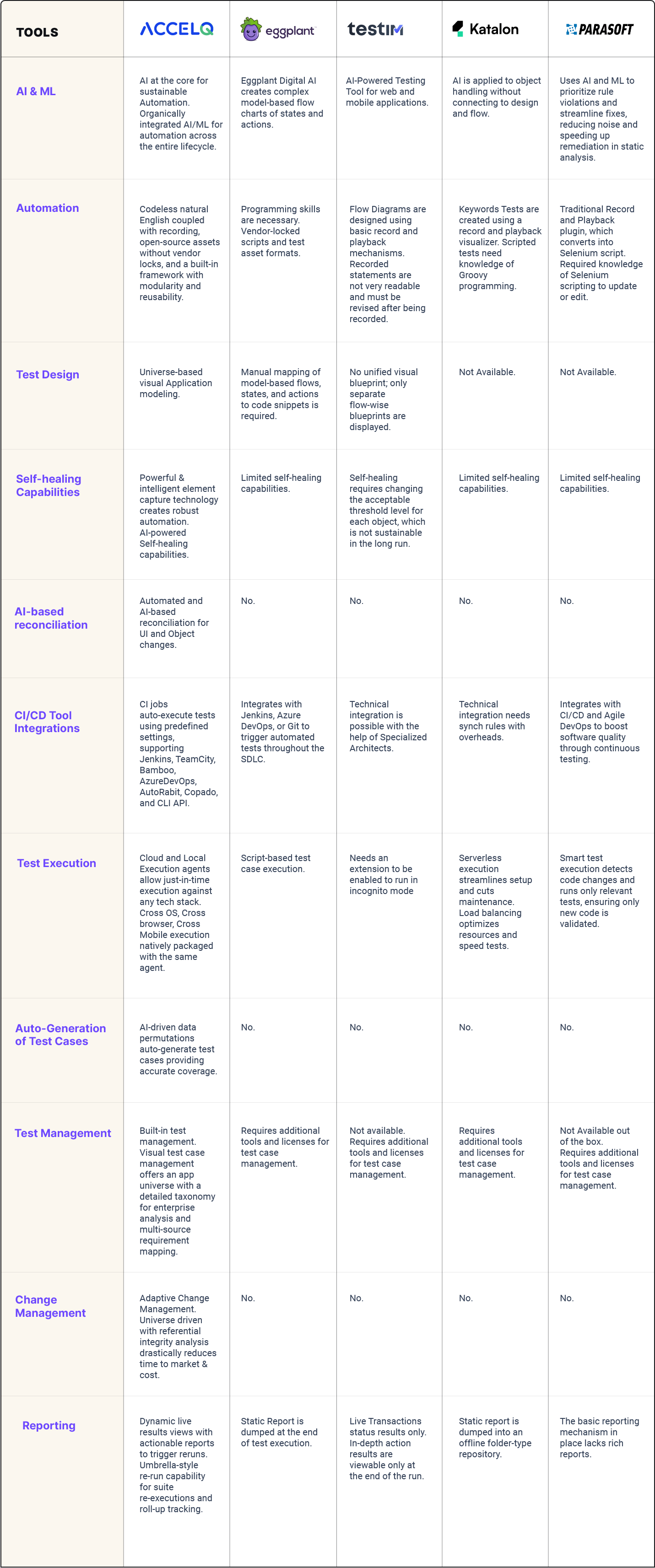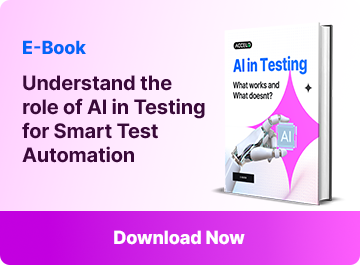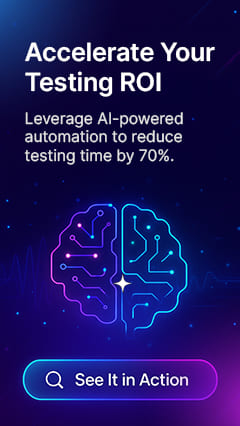Top 10 Artificial Intelligence Testing Tools In 2025
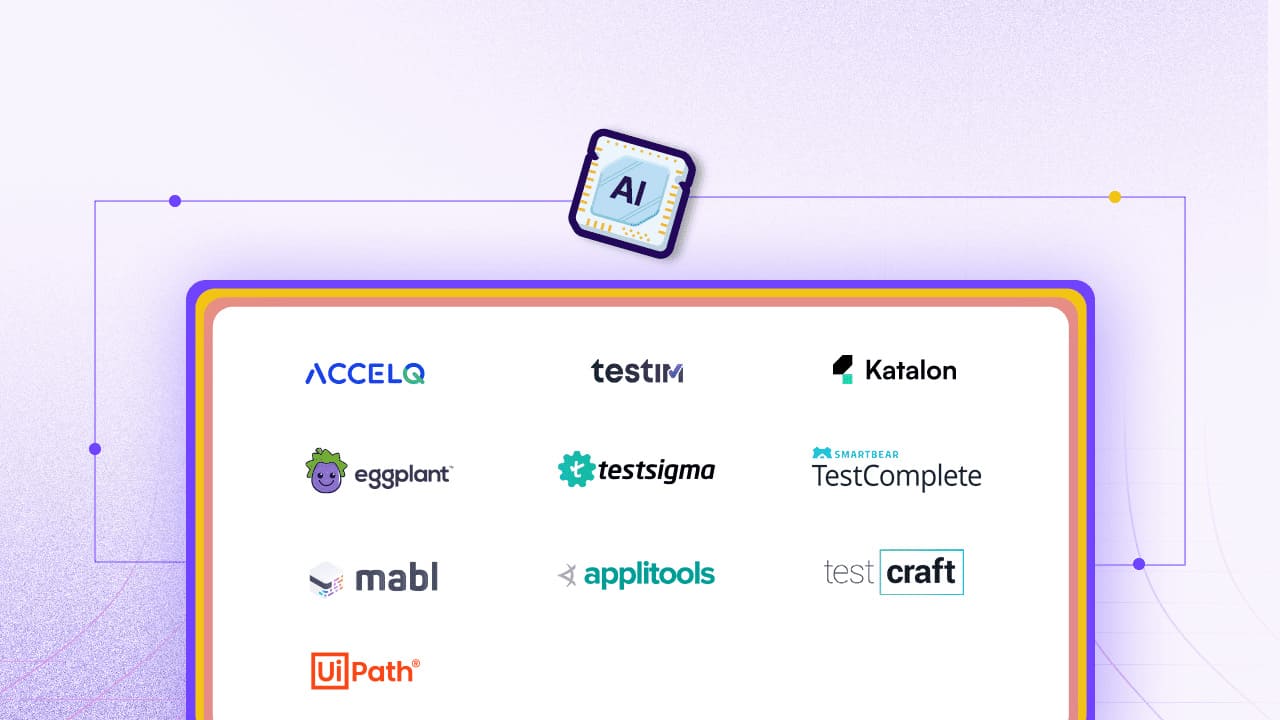
Artificial Intelligence (AI) is revolutionizing industries, changing everyday life, and expanding machines’ capabilities. The U.S. AI market, valued at $103.7 billion in 2022, is projected to grow to approximately $594 billion by 2032. AI is an established technology in many sectors, especially software development and testing.
AI testing tools use artificial intelligence systems to enhance key parts of the software testing process. They assist QA teams in test creation, management, and reporting. These tools handle complex tasks that earlier needed human intelligence.
These tools benefit testers, developers, and startup owners by enhancing their workflows. Let’s dive into AI testing tools features, pros, and cons.
Best 10 AI Testing Tools
1. ACCELQ Autopilot
ACCELQ Autopilot transforms enterprise test automation with AI to discover, create, and maintain tests autonomously—all in one streamlined flow. It’s the industry platform offering a codeless automation solution for various enterprise applications. The platform offers Automate Web/Mobile/API/Desktop/Manual testing for the enterprise stack. ACCELQ leverages AI to build sustainable automation for reliable test execution.
Features:
- Test Step Generator: Automatically generates complete, end-to-end test flows from a simple scenario name, making it easier to set up automated tests.
- No-Code Action Logic Builder: Create test automation logic intuitively without writing any code—ideal for non-technical users and teams.
- AI Designer: This transforms recorded or custom-built tests into optimized, reusable components, making your tests more efficient and adaptable.
- Test Case Generator: Automatically generates comprehensive test coverage by producing various test cases from business process scenarios.
- Autonomous Healing: Automatically adapts tests when changes in the application are under test, ensuring stable test execution despite frequent updates.
- Logic Insights: Offers sophisticated analysis and optimization suggestions to improve test logic, making the automation smarter over time.
Pros & Cons of ACCELQ Autopilot
- Dual-panel view for building test logic & live preview of the app under test
- Automatically adapts due to frequent application changes to keep tests stable
- Grid test execution with inbuilt support for CI and Cloud farm executions
- A brief learning phase, but it's intuitive once familiar
- Best for standard scenarios, less for complex ones
- Slight impact with large projects
Here is a quick sneak peek into how ACCELQ Autopilot uses GenAI and QGPT for agentic test automation: https://youtu.be/jTcSqiBlt2U
2. Tricentis Testim
Tricentis Testim is an AI-powered testing tool for web and mobile applications. It helps to quickly author well-designed, AI-stabilized tests for reducing maintenance.
Features:
- The visual editor records user flows and configures them.
- AI uses smart locators to find web elements and auto-updates tests to avoid failures caused by layout changes.
- Diagnoses failed tests through highlighted screenshots and failure suggestions.
Pros & Cons of Tricentis Testim
- Fast authoring increases test coverage and application quality
- Quickly finds root causes of bugs for faster fixes and releases
- AI-powered stabilizers reduce flakiness and save resources
- Setup is difficult due to unclear and complex documentation
- Tests may become unstable when many are run at once
- Reports lack detail in test scripts and step-by-step actions
3. Katalon
Katalon TestOps is a modern quality management platform that enables you to test, launch, and optimize the best digital experiences. It provides capabilities for test automation teams to collaborate, manage, scale, and continuously improve testing operations.
Features:
- Plan tests alongside releases and builds, then schedule runs easily.
- Organize designed tests into dynamic test suites using TestOps.
- Generate reports such as release readiness and requirement coverage.
Pros & Cons of Katalon
- Finds visual regressions with AI-powered comparison methods
- Tests are distributed across CI environments to speed up execution
- Generate manual tests from Jira issue descriptions using GPT-powered AI
- Takes time to master advanced features, especially for new users
- Setting up integrations with specific tools can be difficult
- AI may miss important test areas, leading to incomplete coverage
4. Eggplant

Eggplant Test employs a model-based digital twin testing method powered by AI. This AI automation software simulates real user behavior in applications without source code.
Features:
- AI test modeling ensures apps work across all browsers, operating systems, and devices.
- Model-based testing enhances app performance by predicting behavior in diverse conditions.
- Optimizes CI/CD pipelines with Jenkins, Bamboo, and GitHub integrations to boost test coverage.
Pros & Cons of Eggplant
- Automates manual tests to increase speed and reduce errors
- Generates code from flowcharts for easier process automation
- Uses image recognition to test apps like real users do
- Reports lack detail and in-depth test insights
- Has a high learning curve for new users
- The licensing cost is high for small teams or startups
5. TestComplete

TestComplete provides an intelligent object repository and supports over five hundred controls. One of these AI software testing tools is easy to maintain tests.
Features:
- AI-driven visual recognition streamlines test creation by precisely identifying dynamic elements.
- Integrate automated tests into CI tools to speed up continuous testing in DevOps.
- Automate test reports for status updates through a single interface.
Pros & Cons of TestComplete
- Automates tests across web, UNIX, and other systems
- Python, JavaScript, and C# libraries for easy test management
- Scalable test suite creation and execution
- Weak error handling makes managing failed tests harder
- Problems with Jenkins and Git disrupt smooth test runs
- High pricing limits access for budget-conscious teams
6. Testsigma
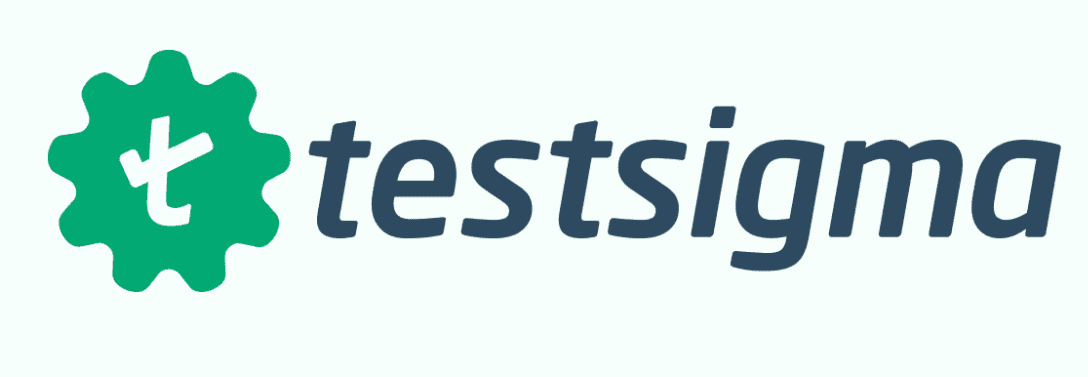
Testsigma offers a test automation solution for continuous Agile and DevOps testing. It is one of the AI test automation tools that can identify changes in application elements.
Features:
- Auto-healing keeps tests working by fixing element locators when the app changes.
- The Suggestions Engine uses artificial intelligence to diagnose and propose solutions for test failures to reduce the debugging time.
- Integrates with Azure DevOps, Bamboo, and Jenkins for continuous testing after merging code.
Pros & Cons of Testsigma
- Streamlines test automation for complex testing scenarios
- Team members can share projects, test cases, and data sources
- Provides test reports in screenshots and videos
- Users switching from open-source tools may find it hard to learn
- Handling complex test data can sometimes be challenging
- Integrations with lesser-known tools or specific versions can run into issues
7. Applitools

Applitools provides intelligent, cutting-edge application testing solutions. It is one of the AI tools for software QA that supports every stage of the testing lifecycle.
Features:
- An easy-to-use recorder can create complex tests without writing code.
- Self-healing locators keep test pipelines clean and flowing.
- Integrates with GitHub Actions and CircleCI to test continuously.
Pros & Cons of Applitools
- Compatible with any test framework through extensive software development kits
- Speeds up testing by adding Visual AI checkpoints to uploaded URLs
- Run all tests or individual ones with a single click
- Struggles with content that changes frequently
- Teams new to AI-powered testing may need time to learn
- More expensive for small teams or projects
8. Mabl

Mabl is a modern, cloud-native platform designed for scalability. It uses generative AI to enhance test coverage and maintenance efficiency. The platform with artificial intelligence relentlessly focuses on the user experience.
Features:
- AI detects potential test issues to improve stability.
- Clustering tracks page load and run times to identify testing gaps.
- Machine learning optimizes test timing for faster execution in any environment.
Pros & Cons of Mabl
- Uses machine learning to update tests based on app changes
- Tracks test performance to improve testing strategies
- Provides insights to resolve issues quickly during testing
- Requires technical knowledge, which may be difficult for beginners
- Limited customization options for advanced users
- Works with many CI/CD tools but may struggle with some app integrations
9. TestCraft

TestCraft by Perfecto offers a robust Selenium-based automated testing solution. Its AI/ML technology supports remote work and collaboration. This AI testing tool supports manual and automated testing to deliver web-based software.
Features:
- Web app localization, like geofencing, time zones, and more, can be tested.
- ML-based algorithms remove false negatives via automated detection.
- Test reports, like screenshots and crash logs, are available.
Pros & Cons of TestCraft
- Create tests quickly without any coding required
- Debug software locally on any platform
- Easily updates tests when the app changes
- May run slower with large or complex test suites
- Less flexible for very complex test cases
- Takes time to learn all available features
10. UiPath
The UiPath Test Suite is a testing solution powered by the UiPath Business Automation Platform. Test Suite provides quality assurance (QA) teams with enterprise-wide, production-grade, and AI-powered test automation capabilities.
Features:
- Checks API availability, security, and performance to ensure reliable communication between software applications.
- Manages test data effectively within the test suite to create and modify data needed for tests.
- Generates detailed test result reports to understand application performance and identify improvement areas.
Pros & Cons of UiPath
- Uses AI to auto-generate test cases and reduce manual scripting
- Runs tests across OS/devices using cloud environments
- Supports Git, SVN, TFS for test versioning
- Test creation process lacks ease-of-use for non-technical users
- Mobile test support lacks real devices and parallel execution
- Higher cost compared to other testing tools
Should developers use AI tools during coding tests?
Yes, developers can use AI tools during coding tests. As per a Github survey, 70 percent of developers say these tools offer better code quality, completion time, and resolving errors. By seamlessly integrating AI tools into the workflow, developers can explore many solutions. It’s not about replacing human skills; it’s about enhancing them. Let’s see a few more benefits of how these tools are assisting developers:
- AI tools help them meet existing performance standards with faster outputs.
- These tools save developers time so they can focus on designing new features.
- It helps them learn while they work, instead of making upskilling an additional task.
- Developers can automate tasks using AI tools, giving them more time for security reviews and planning.
- These tools can reduce coding errors and improve accuracy, leading to more reliable software.
Thus, nearly 92 percent of developers use AI tools at work to improve their daily tasks and team collaboration.
Conclusion
AI is becoming more important in the digital age, primarily in software testing. Consider the above options when choosing AI based test automation tools. These tools can minimize errors by automating the tasks. They can speed up testing than traditional tools.
ACCELQ is a codeless test automation and management platform powered by AI, built on the cloud. The platform provides unified automation for web, mobile, API, database, and packaged apps. Its automation-first, AI-powered self-healing capabilities make it easy for testing teams without programming skills to use. ACCELQ, an industry-first autonomics-based automation platform, can help businesses achieve 7.5x faster automation, 72% lower maintenance, and 53% cost reduction.
Accelerate your AI testing with ACCELQ Autopilot. Book a free demo to see how it meets 2025’s testing demands.
You Might Also Like:
 Playwright vs Selenium: Which One to Choose in 2025
Playwright vs Selenium: Which One to Choose in 2025
Playwright vs Selenium: Which One to Choose in 2025
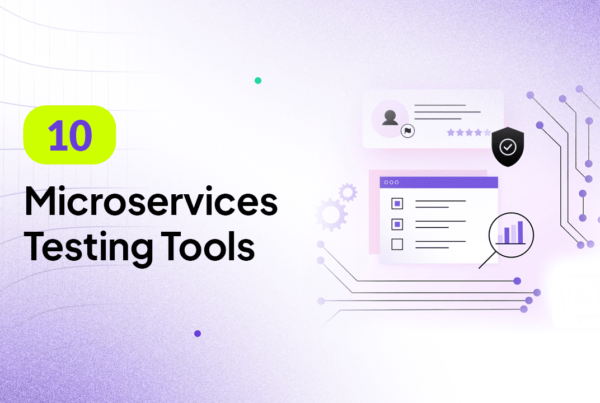 Top 10 Microservices Testing Tools In 2025
Top 10 Microservices Testing Tools In 2025
Top 10 Microservices Testing Tools In 2025
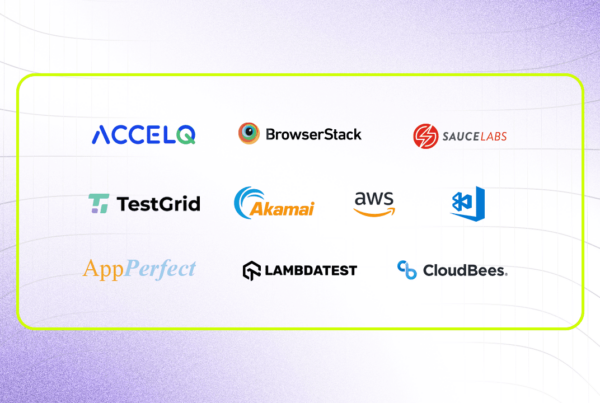 Top 10 Cloud Testing Tools and Services In 2025
Top 10 Cloud Testing Tools and Services In 2025






























